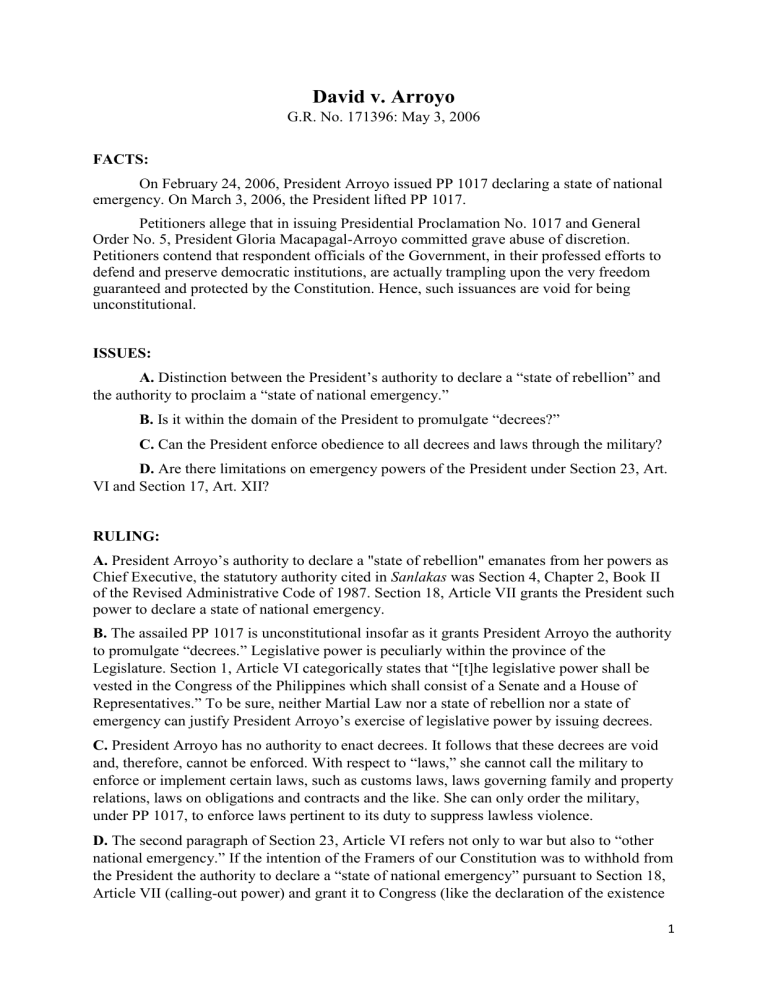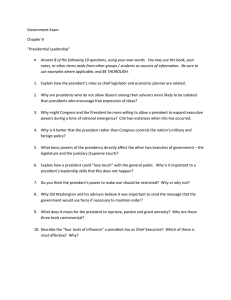
David v. Arroyo G.R. No. 171396: May 3, 2006 FACTS: On February 24, 2006, President Arroyo issued PP 1017 declaring a state of national emergency. On March 3, 2006, the President lifted PP 1017. Petitioners allege that in issuing Presidential Proclamation No. 1017 and General Order No. 5, President Gloria Macapagal-Arroyo committed grave abuse of discretion. Petitioners contend that respondent officials of the Government, in their professed efforts to defend and preserve democratic institutions, are actually trampling upon the very freedom guaranteed and protected by the Constitution. Hence, such issuances are void for being unconstitutional. ISSUES: A. Distinction between the President’s authority to declare a “state of rebellion” and the authority to proclaim a “state of national emergency.” B. Is it within the domain of the President to promulgate “decrees?” C. Can the President enforce obedience to all decrees and laws through the military? D. Are there limitations on emergency powers of the President under Section 23, Art. VI and Section 17, Art. XII? RULING: A. President Arroyo’s authority to declare a "state of rebellion" emanates from her powers as Chief Executive, the statutory authority cited in Sanlakas was Section 4, Chapter 2, Book II of the Revised Administrative Code of 1987. Section 18, Article VII grants the President such power to declare a state of national emergency. B. The assailed PP 1017 is unconstitutional insofar as it grants President Arroyo the authority to promulgate “decrees.” Legislative power is peculiarly within the province of the Legislature. Section 1, Article VI categorically states that “[t]he legislative power shall be vested in the Congress of the Philippines which shall consist of a Senate and a House of Representatives.” To be sure, neither Martial Law nor a state of rebellion nor a state of emergency can justify President Arroyo’s exercise of legislative power by issuing decrees. C. President Arroyo has no authority to enact decrees. It follows that these decrees are void and, therefore, cannot be enforced. With respect to “laws,” she cannot call the military to enforce or implement certain laws, such as customs laws, laws governing family and property relations, laws on obligations and contracts and the like. She can only order the military, under PP 1017, to enforce laws pertinent to its duty to suppress lawless violence. D. The second paragraph of Section 23, Article VI refers not only to war but also to “other national emergency.” If the intention of the Framers of our Constitution was to withhold from the President the authority to declare a “state of national emergency” pursuant to Section 18, Article VII (calling-out power) and grant it to Congress (like the declaration of the existence 1 of a state of war), then the Framers could have provided so. Clearly, they did not intend that Congress should first authorize the President before he can declare a “state of national emergency.” The logical conclusion then is that President Arroyo could validly declare the existence of a state of national emergency even in the absence of a Congressional enactment. Generally, Congress is the repository of emergency powers. This is evident in the tenor of Section 23 (2), Article VI authorizing it to delegate such powers to the President. Certainly, a body cannot delegate a power not reposed upon it. However, knowing that during grave emergencies, it may not be possible or practicable for Congress to meet and exercise its powers, the Framers of our Constitution deemed it wise to allow Congress to grant emergency powers to the President, subject to certain conditions, thus: (1) There must be a war or other emergency. (2) The delegation must be for a limited period only. (3) The delegation must be subject to such restrictions as the Congress may prescribe. (4) The emergency powers must be exercised to carry out a national policy declared by Congress. Section 17, Article XII must be understood as an aspect of the emergency powers clause. The taking over of private business affected with public interest is just another facet of the emergency powers generally reposed upon Congress. Thus, when Section 17 states that the “the State may, during the emergency and under reasonable terms prescribed by it, temporarily take over or direct the operation of any privately owned public utility or business affected with public interest,” it refers to Congress, not the President. Now, whether or not the President may exercise such power is dependent on whether Congress may delegate it to him pursuant to a law prescribing the reasonable terms thereof. 2




